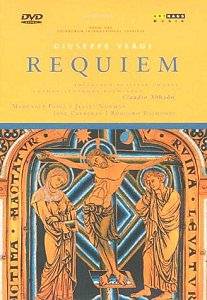VERDI Requiem
(Live recording from Edinburgh Festival, 1982)
 Margaret Price (soprano);
Jessye Norman (mezzo-soprano); Jose Carreras (tenor); Ruggero Raimondi (bass);
Margaret Price (soprano);
Jessye Norman (mezzo-soprano); Jose Carreras (tenor); Ruggero Raimondi (bass);
Edinburgh Festival Chorus, London Symphony Orchestra/Claudio Abbado
 Arthaus DVD 100146
Arthaus DVD 100146
 [146 87 mins]
[146 87 mins]
Crotchet
AmazonUK
AmazonUS

With Gergiev's new Philips recording of Verdi's Requiem proving something
of a disappointment in the composer's centenary year hopes of something special
hinge on Arthaus's DVD release of this justly famous Edinburgh Festival
performance. It is sensational, one of the most compelling performances I
have heard of this work - and a performance Claudio Abbado will find
hard to match in his forthcoming EMI release of the work.
The Requiem is notoriously difficult to cast but here Abbado
gets it absolutely perfect. On paper this seemed a quartet of soloists to
die for and the performance soon confirms that this is the case - together
they make for the most satisfying, matchless quartet, possibly without rival,
on any recording of the work. The contrast in tone and colour between the
four voices is resplendent, the phrasing and care for dynamics extraordinarily
refined (listen to any one of Margaret Price's hushed pianissimos
to hear how moving this music can sound). Jose Carreras, infinitely
more musical than Bocelli on the Gergiev recording, brings gravitas and lyricism
to his role in equal measure (the Ingemisco being a particular triumph).
Jessye Norman is simply mesmerising, her tone both polished and velvety,
the nobility of her phrasing irresistible. Some will indeed resist this,
perhaps preferring the lighter hue which Borodina brings to the Philips
recording, but it is an example of this singer's supreme artistry. Ruggero
Raimondi is the subtlest of basses, bronze in tone but like a powerhouse
throughout. Margaret Price, one of the greatest of Mozartians, brings great
delicacy to her singing but has the strength of voice to ride over the orchestra
in both the Dies Irae and Libera me as she punches out
her thrilling high Cs. This is great singing without question.
If there is a reason that this quartet is more successful than almost any
other, it is because the voices have the dexterity to meet the demands of
Verdi's writing. Price has the lightness of tone which Schwarzkopf brought
to her recordings with de Sabata and Giulini, but, unlike Schwarzkopf, Price
also has that reserve and power which she later brought to Wagner in a celebrated
Tristan with Carlos Kleiber. If there is a problem with the casting
of this particular part in recent years it is because conductors favour lyric
sopranos rather than dramatic ones - René Fleming being a case in
point. Beautiful though her singing is for Gergiev, one is constantly aware
that the reach of the role is often too uncomfortable for her voice. Norman,
however, comfortably spans both the mezzo and soprano registers so effortlessly
there is never the slightest suggestion that the voice is under any strain.
It is imperious singing that really makes this disc an essential experience.
Holding all this together is an inspired Claudio Abbado. His mastery of the
score is never in doubt, his handling of the chorus superb, and he encourages
from the LSO hugely dynamic playing (the brass are truly thrilling). His
perception of the work owes more to Riccardo Muti than Giulini - this is,
after all, an electrifying reading which rests on spontaneity rather than
over-preparedness. It is a classic 'Italianate' performance played with warmth
of expression, but is highly dramatic where it matters.
Humphrey Burton, the director of this film, brings some nice touches
to the performance. When we hear the brass chorales in the Dies Irae
the camera pans to cherubim blowing trumpets, and there are some exceptional
wide-panned views of the stage which emphasise the enormity and grandeur
of the work's structure. Here we have an orchestra and chorus marshalled
on stage like a waiting army. Close ups of both singers and conductor are
judicious (and much less intrusive than in some DVD releases of concert
performances).
As ever with Arthaus the booklet is a disappointment: the translation into
English is stilted and it tells us nothing at all about the performance (even
the biographies of the principals are breathtakingly short). The disc is
perfectly fine, with picture and sound quality matching the performance,
although the box tells us there is a trailer for this performance. I have
yet to find it.
This is a DVD that listeners will return to again and again for a performance
that ranks amongst the very greatest ever committed to disc. It cannot fail
to give pleasure.
Marc Bridle

